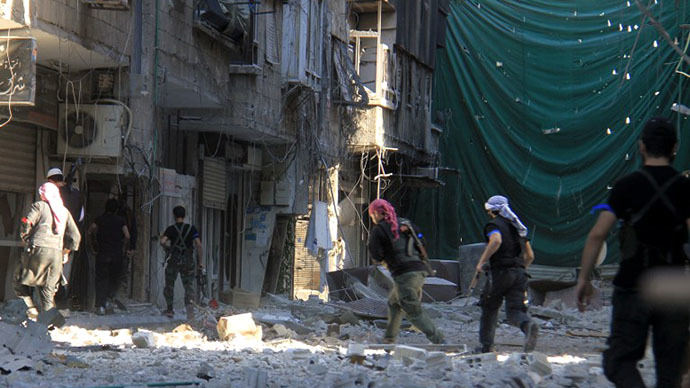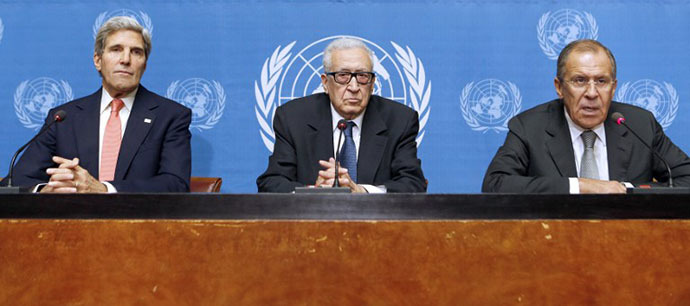‘Arab states must unite behind peaceful solution for Syria’ – UN peace envoy

The Arab World needs to unify its position on Syria and back a peaceful solution to the crisis in the Middle Eastern state, UN and Arab League Special Envoy on Syria, Lakhdar Brahimi, told RT’s Arabic channel, Rossiya al-Yaum.
Brahimi acknowledged that the Arab countries are currently
divided on the issue, with “few strongly supporting the
opposition and others abstaining.”
But he believes that after last week’s accord between the US and
Russia, which calls for the destruction of all the Syrian
government’s chemical stockpiles under international supervision,
the Arab position “will also be in favor of a solution that
satisfies the people of Syria.”
“We look forward to a unified Arab position that works for the
benefit of a peaceful solution,” the envoy stressed.
“Everyone says he wants good for the Syrian people and for
Syria to come out of its crisis, which is where we hope to unite
the stance in favor of a peaceful solution, which we call
for.”
He reiterated that the stance of the UN Secretary-General, Ban
Ki-moon, who said that “there’s no military solution” in
Syria, is “identical” to the one voiced by his Arab League
counterpart, Nabil Elaraby.
Brahimi has called the Syrian chemical weapons agreement a
“triumph” on the part of the Russian foreign minister, Sergey
Lavrov, and US Secretary of State, John Kerry. He thinks it
would be impossible to solve the Syrian crisis without Moscow and
Washington reaching common ground.
“I told you with great regret that the Syrian parties aren’t able
to talk to each other,” he said. “The best solution is for
the Syrians to meet with each other. They don’t need anyone to
solve their problem, but unfortunately this wasn’t possible, and
the countries of the region also unfortunately weren’t able to
play this brotherly role. Therefore, it must start from the outer
circle, I told the UN Security Council that there is an Inner
Circle in Syria and Middle Circle, which is the region, and an
Outer Circle which is the international community and the
Security Council, namely Russia and the US.”
If Russia and the US keep talking peace it will result in the
countries of the Middle Eastern region joining them and “most
importantly for the Syrian brothers to accept it,” the envoy
explained.

Brahimi said he plans to have talks with Lavrov and Kerry again
next week on the sidelines of the UN General Assembly in New York
to establish the “certain date” for the Geneva 2
conference on Syria in the “hope that it will be in
October”.
“The conference should be held with all Syrian parties that
are capable of ending the fighting and also foreign parties that
have an interest or an influence or both,” he stressed.
“These countries must participate in the conference to
promote, encourage or incite the Syrian parties to reach a
solution.”
The envoy believes that there will be a quorum in Geneva. This
despite a majority in opposition who rejected the accord between
Moscow and Washington, and counted on a US-led military strike
at Syrian regime targets.
Such reaction from the rebels “is normal because they weren’t
a party in the negotiations and nobody told them or warned them
that ‘something is being cooked up’ with respect to the Chemical
weapons,” Brahimi stressed. “They were expecting an attack
and were waiting for one at any moment, and were surprised to see
an agreement that pushed away such a strike. Of course, it is
only natural that the reaction would be confusion.”
“I am certain that all of this will change and that all
spectrums of the opposition will realize that there is no
military solution and that foreign military intervention is
unlikely… Syria doesn’t need new military action. It had enough.
I am sure that the situation will change and people will
understand that there is no military solution and therefore there
is a need to search for a political solution between the Syrians
themselves with external assistance,” he added.
The envoy also expressed hope that the destruction of Assad’s
chemical arsenal will prepare the ground for the long awaited
conference, which would rid the Middle East not only of chemical,
but all weapons of mass destruction.
“Israel doesn’t admit that it has nuclear weapons or chemical
weapons, while it has been said years ago that Israel own about
200 nuclear bombs and it has been reported recently that this
number has increased to 400 bombs,” he said. “Israel,
unlike Syria, signed the [Chemical Weapons] Convention in 1992,
but has not ratified it – while Syria has refused to sign. This
is a big hurdle and the West promised clearly and explicitly that
this conference related to clearing the region from such arms
will be held. It is being delayed time and again.”
“I think that the Arab countries should raise their voices
high for the convening of this conference and to make it a
success. Otherwise, we can’t stop the countries of the region,
not only Iran, from owning nuclear weapons and other mass
destruction weapons,” Brahimi added.
The US and its allies blame Assad forces for using sarin gas
against innocent civilians in a chemical attack near Syrian
capital, Damascus, on August 21.
Despite the Syrian government denying the accusations and no
proof of its guilt being presented by Washington, Obama announced
that there would be “limited military” action against Assad
because the use of chemical weapons can’t be tolerated.
But the US strikes were put on hold after a Russian proposal to
hand the Syrian chemical weapons arsenal to international
inspectors for destruction, a plan that received the full backing
of Assad’s government.
The civil war, in which the government is fighting Western-backed
Islamist militants, has been raging in Syria since March 2011,
and has claimed over 100,000 lives, according to UN estimates.
The statements, views and opinions expressed in this column are solely those of the author and do not necessarily represent those of RT.












